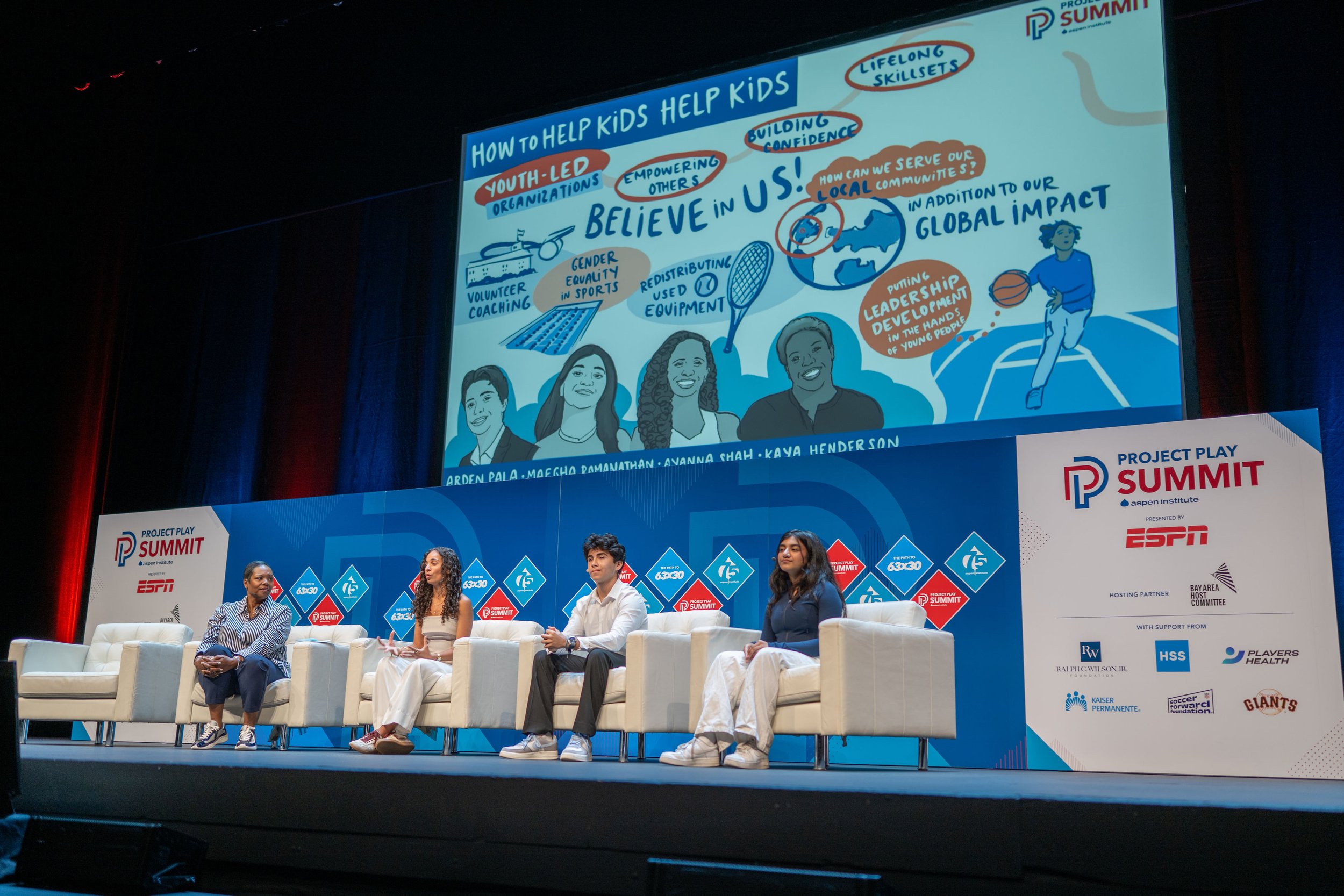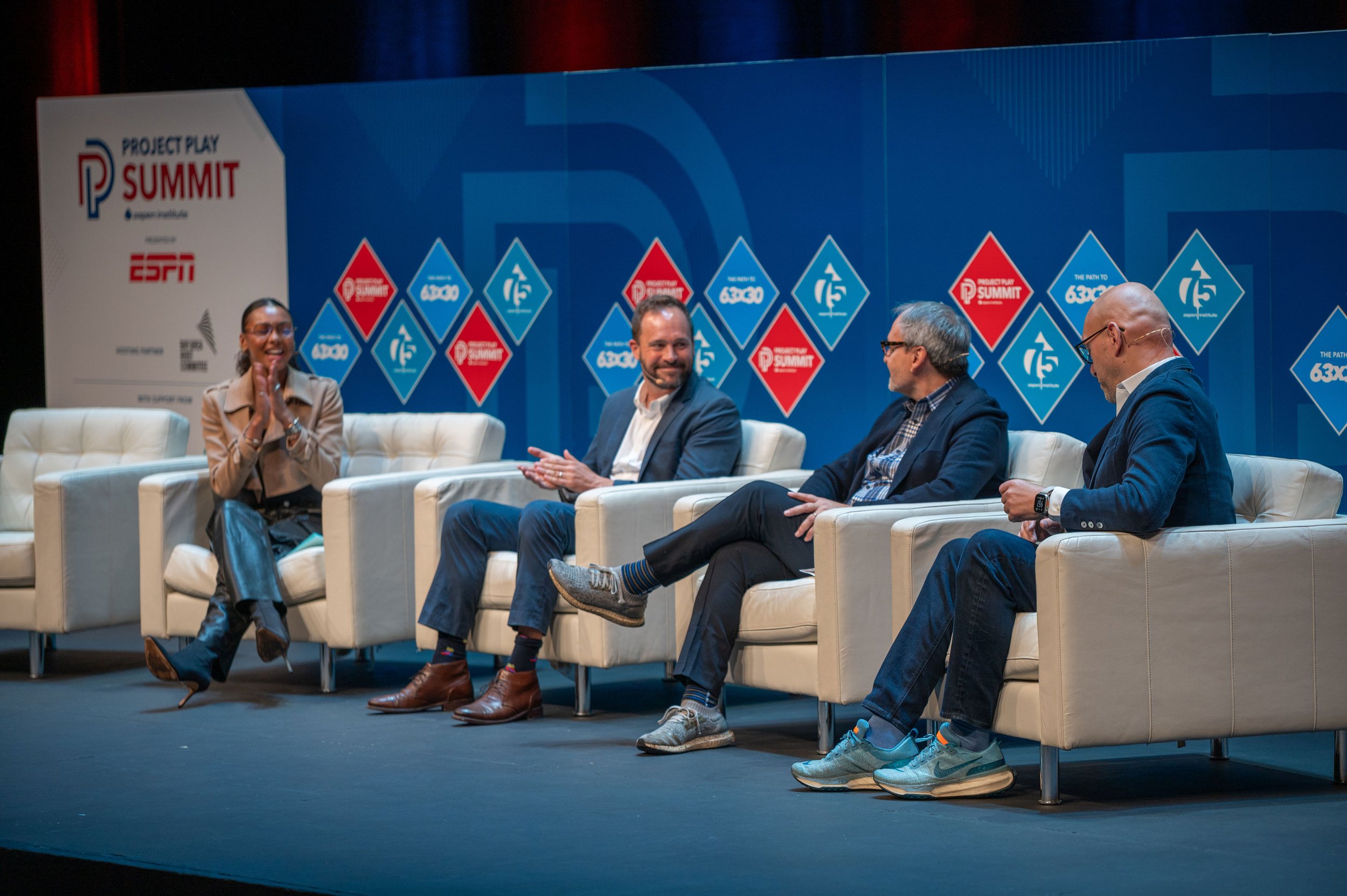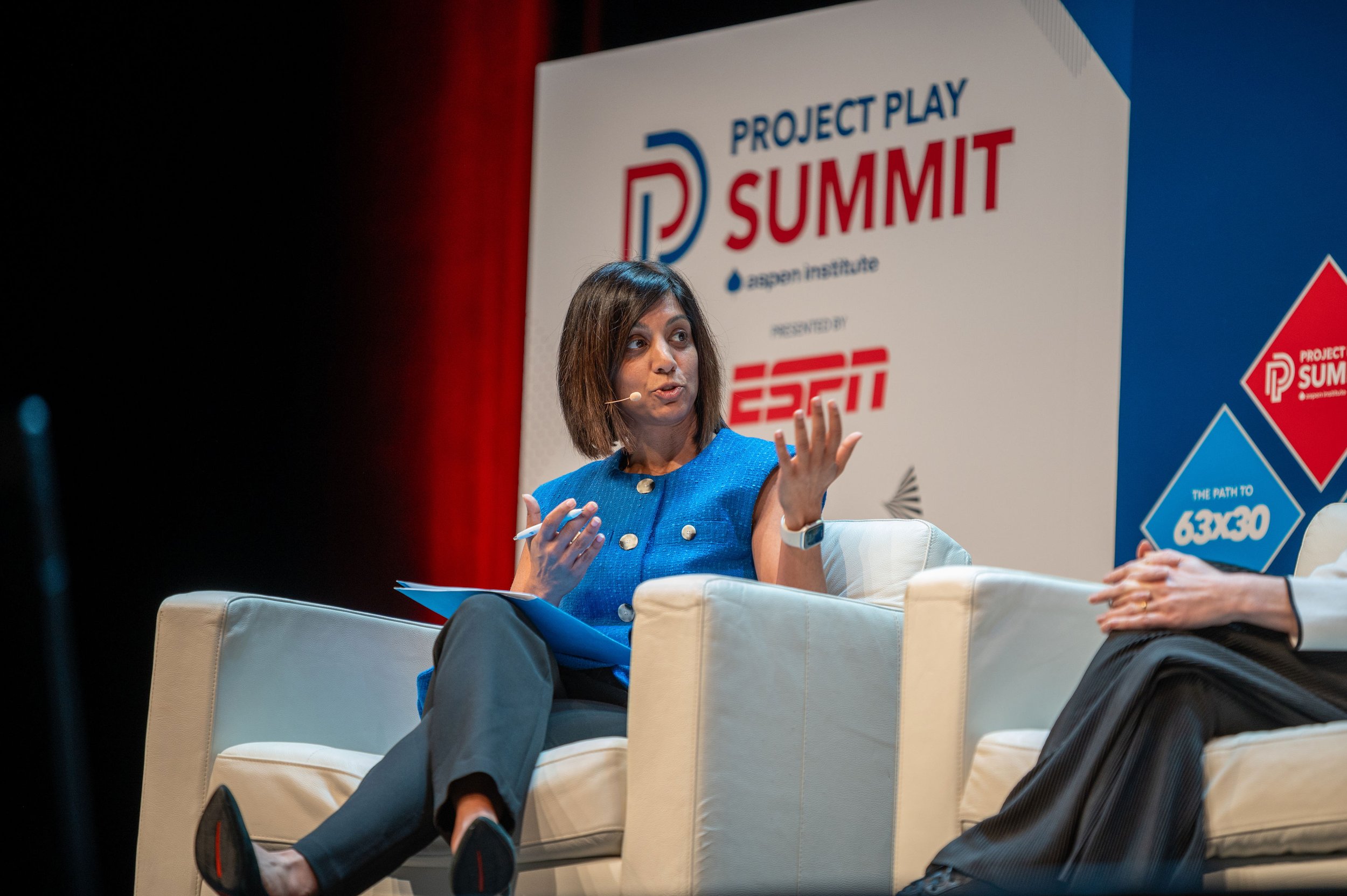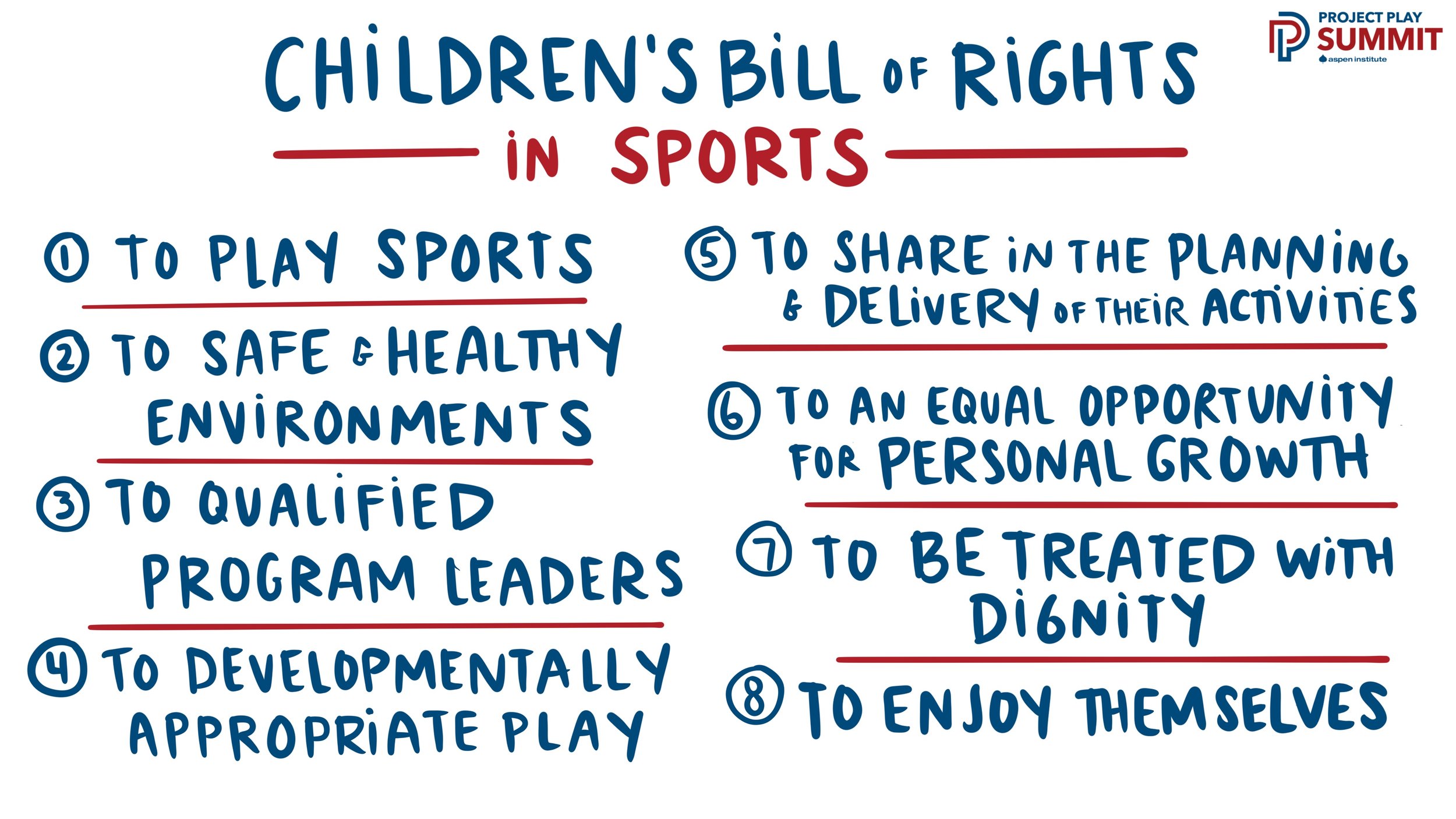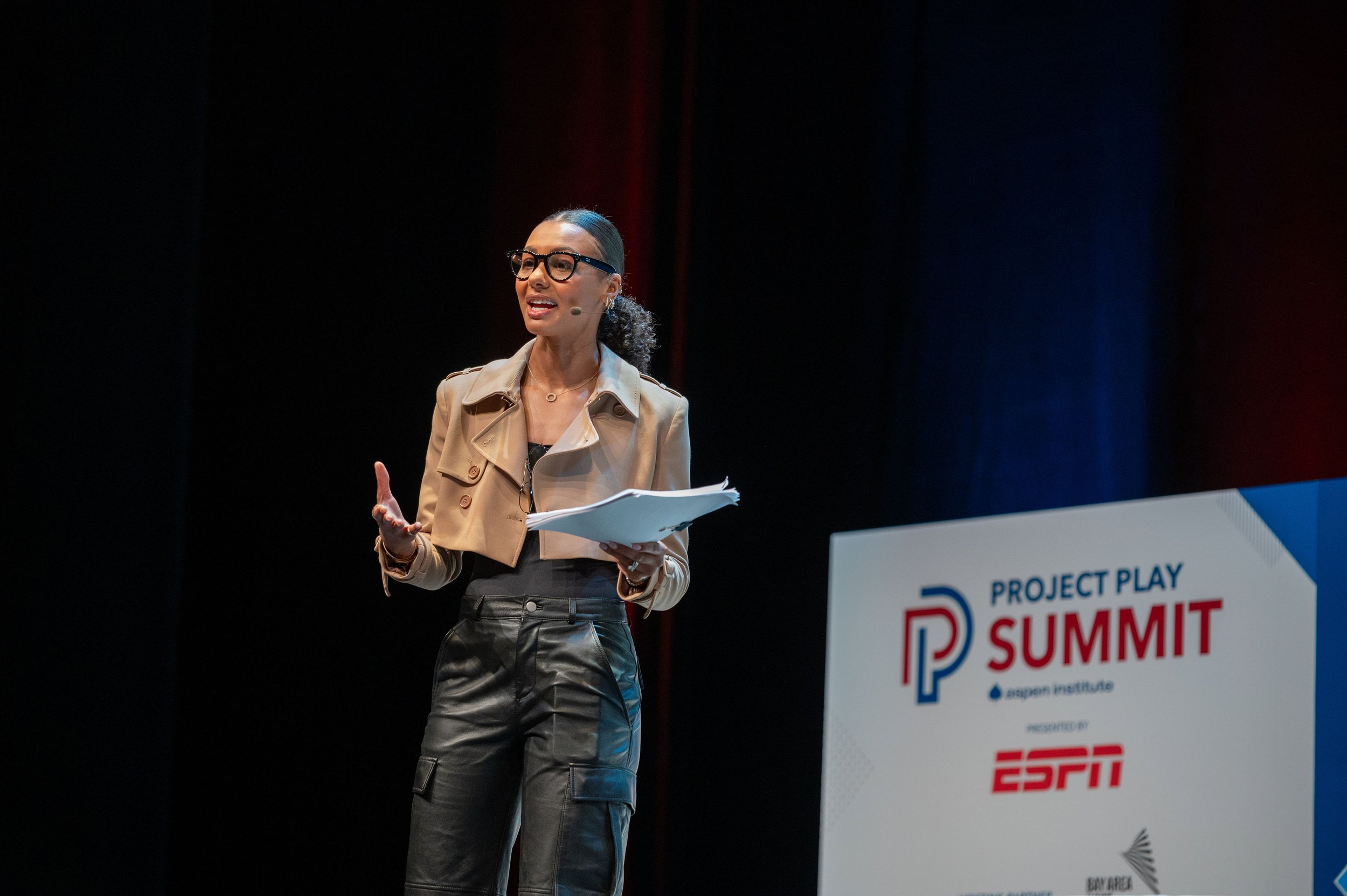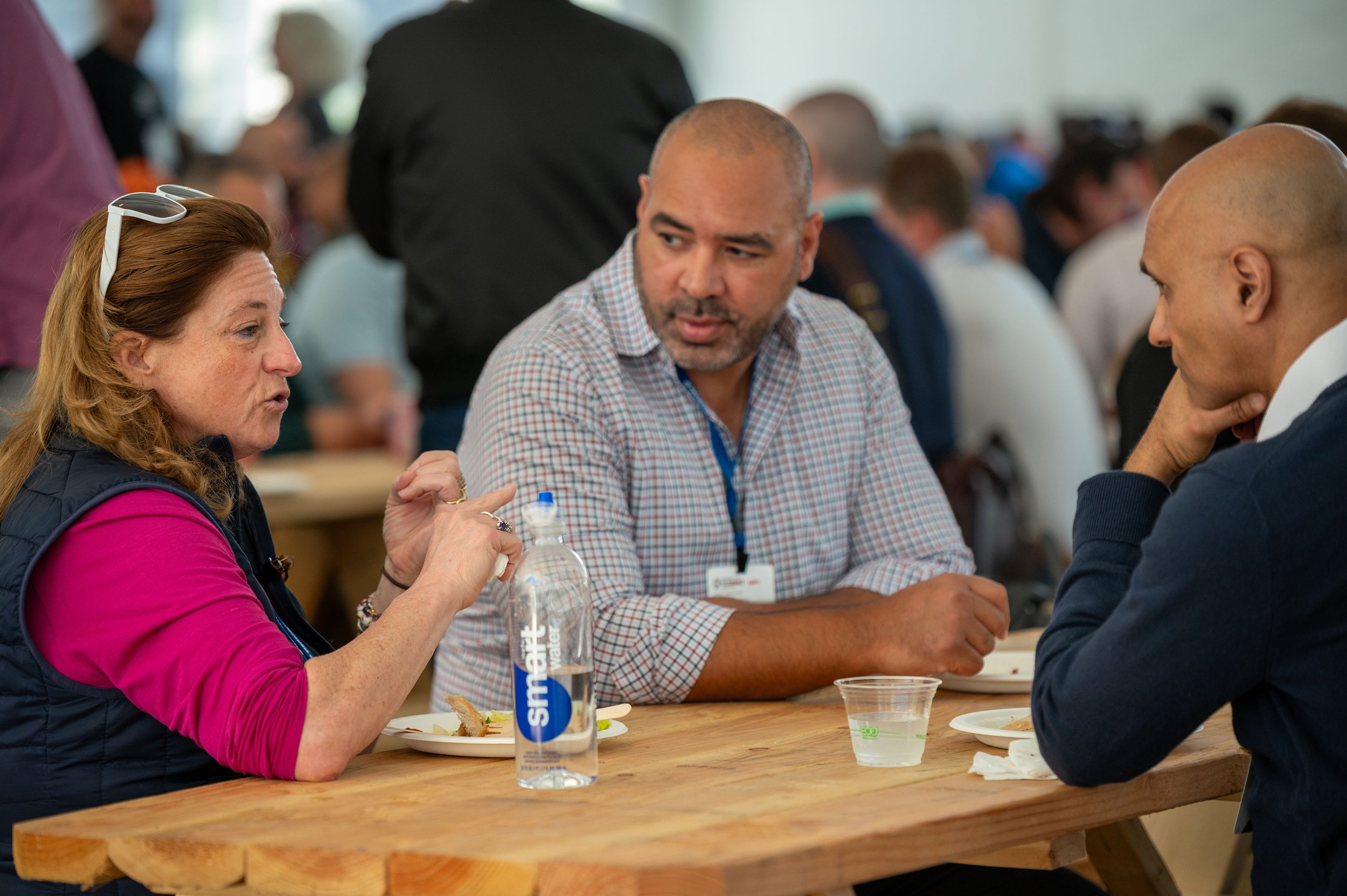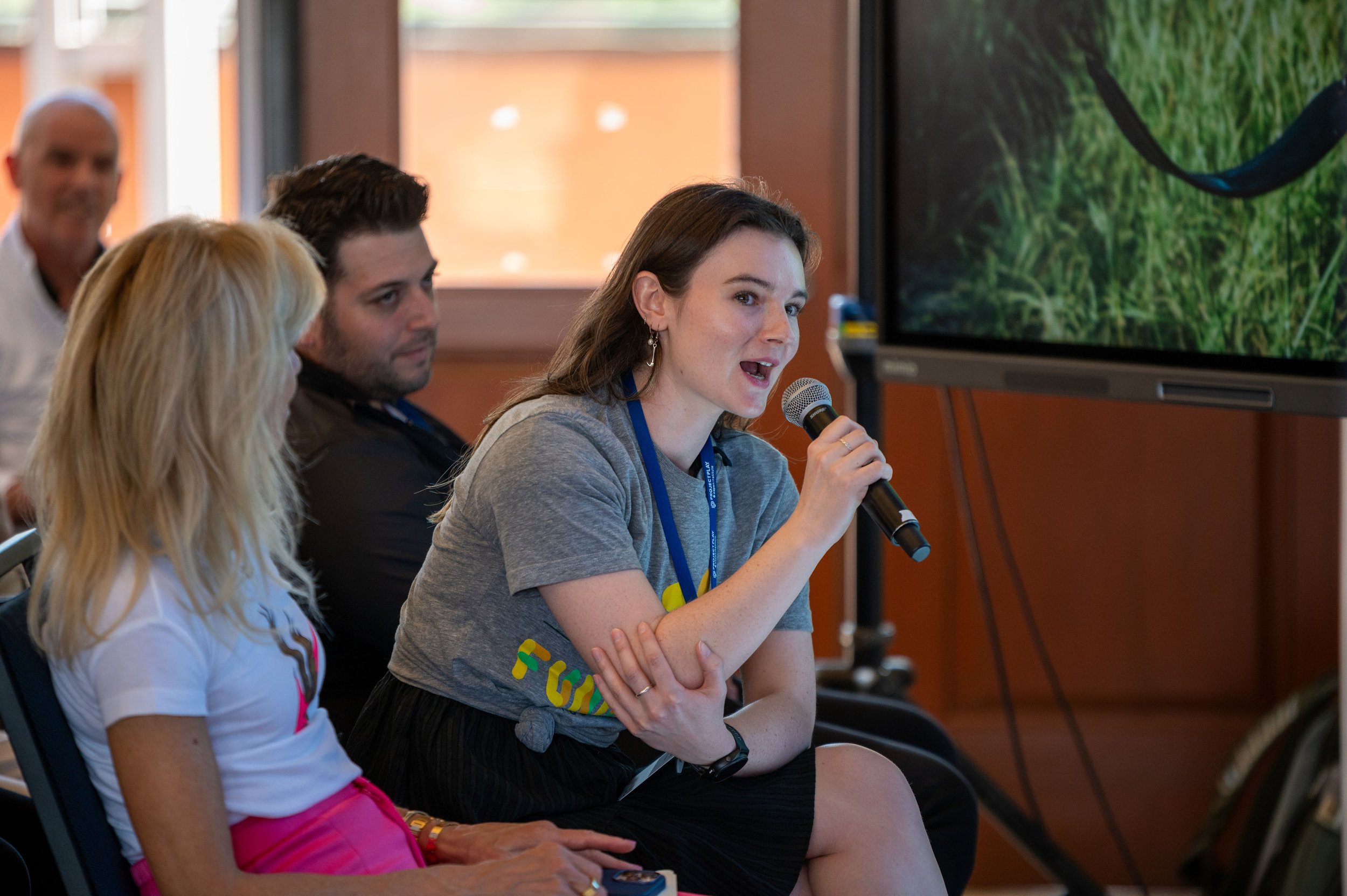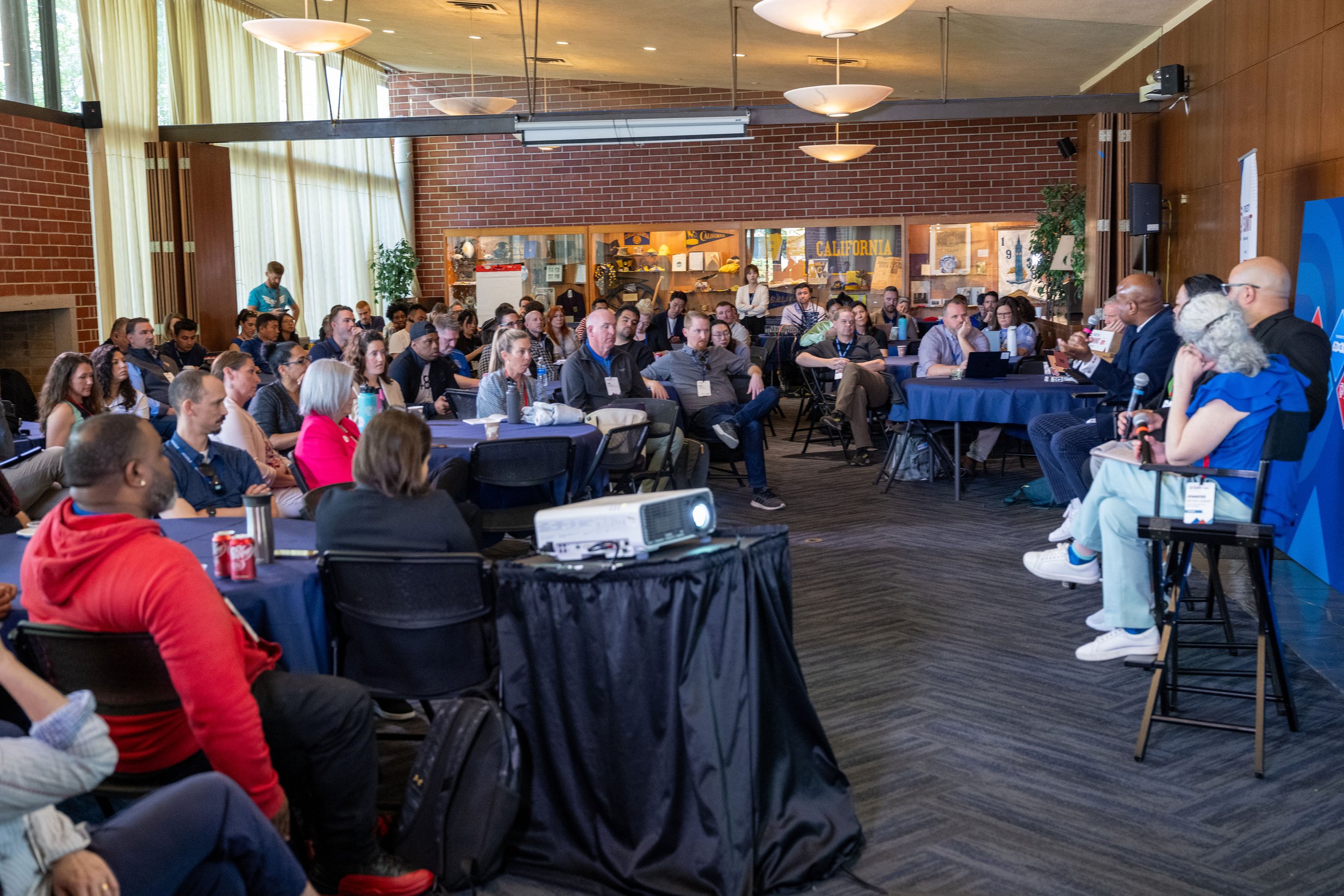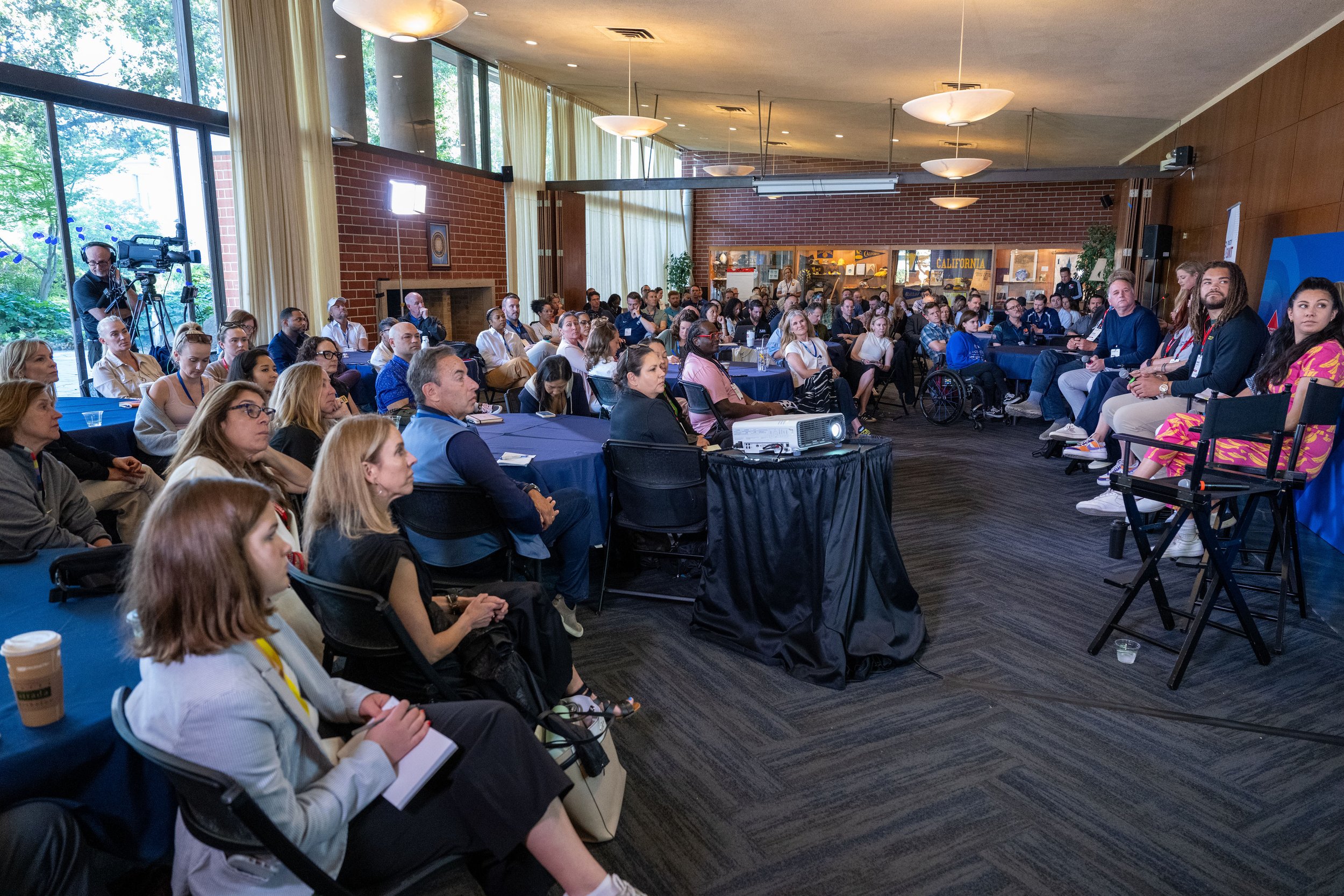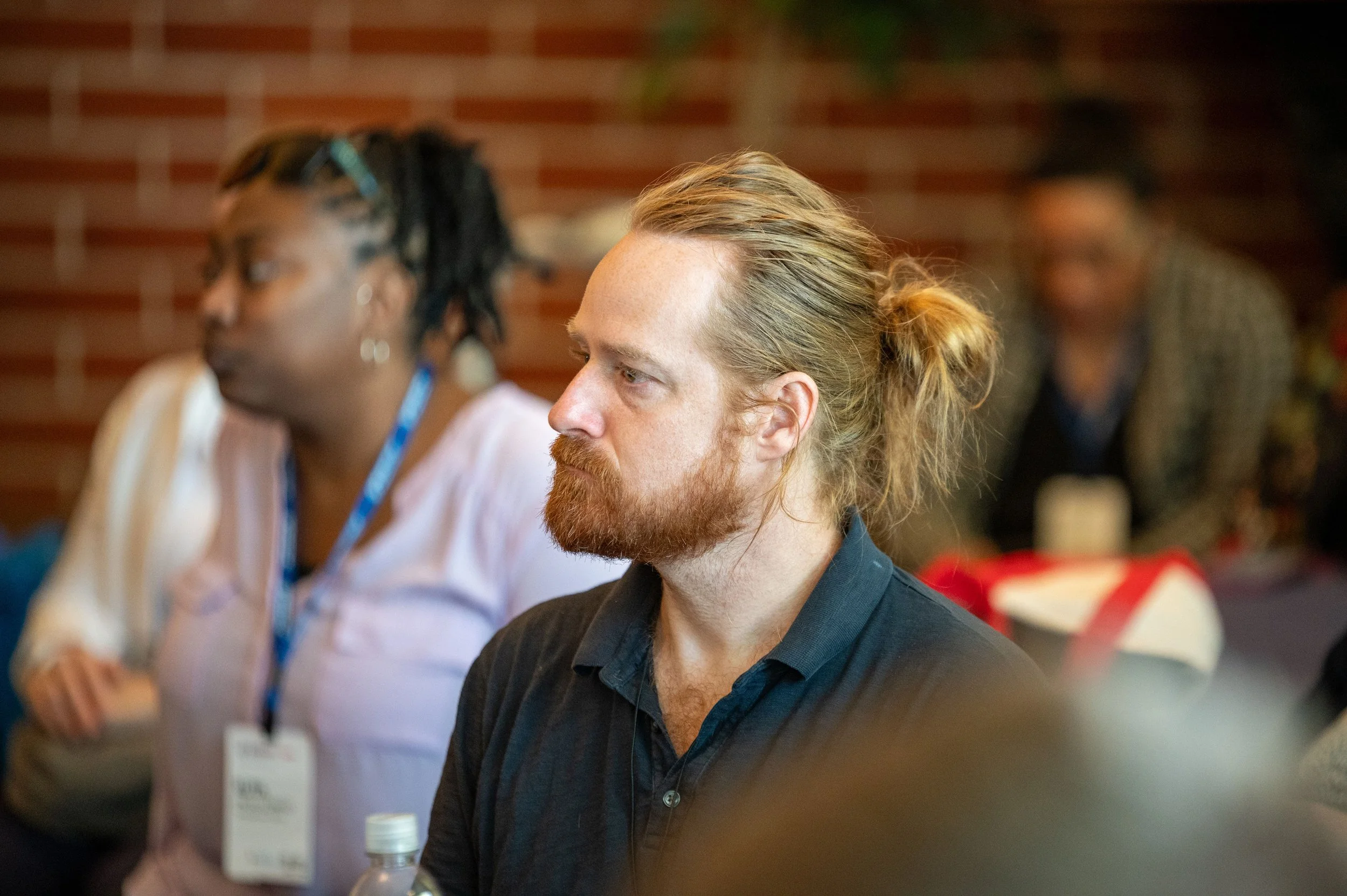“How to Help Kid Help Kids” L-R: Kaya Henderson, Ayanna Shah, Arden Pala, Maegha Ramanathan
Photo: Bryan Walker Ting for the Aspen Institute
BERKELEY, CALIF. – The largest crowd in the history of the Project Play Summit came to the campus of the University of California prepared to share ideas about what it will take to help the nation get 63% of youth playing organized sports by the end of the decade, a call to action made a year earlier by partners of the Aspen Institute’s Sports & Society Program.
The more than 700 leaders in attendance, plus more than 1,000 on livestream, left the two days and its 26 main stage and breakout sessions with clear opportunities to do so.
They explored Project Play’s Theory of Change for Sport in America with its 40 ways to activate and partner, the strategic plan for the 63X30 national roundtable which aims to engage sports parents in year one, ideas on how to get more Latinas and youth with disabilities playing – and how to reverse the overlooked trend of boys dropping out.
The sellout crowd digested evidence-based learnings from an initiative training one million coaches, injury prevention strategies, best practices in local collaboration, and emerging policy opportunities at the state and federal levels. Sports parent blogger Melissa Jacobs gasped at new Project Play survey data showing 1 in 10 parents think their kid can go pro.
The Summit served all that up – plus dollops of inspiration and new grant programs.
Among the announcements: ESPN launched Take Back Sports, a new initiative that aims to help stakeholders grow local recreation leagues, train new coaches, promote multi-sport play when children are young, and bring fun back to youth sports.
“It’s not just (to help the child),” Freddy Rolón, head of sports and global talent for ESPN, said on a panel moderated by ESPN journalist and Summit emcee Malika Andrews. “We’re looking at growing the fanbase. People who participate in sports are six times more likely to be sports fans, and not just in the sports that they participate.”
Eat.Learn.Play., the family foundation of NBA star Stephen and celebrity chef Ayesha Curry, announced that it would partner with ESPN, Under Armour and Curry Brand to expand opportunities in the Oakland Unified School District. Since release of the State of Play Oakland report by ELP and the Sports & Society Program in 2022, the percentage of middle school students playing sports has already risen from 17% then to 45% now.
Plans are on track to reach 50% by the end of the school year. ELP wants to double that.
“We’re on a mission to make sure every kid growing up in (Oakland) has access to the joys and the benefits of participating in sports,” said Chris Helfrich, CEO of ELP. “We’re committed to making ongoing seven-figure annual investments to revitalizing middle school sports so thousands of kids have access to high-quality, no-cost youth sports.”
“Joy of Sport for All” L-R: Malika Andrews, Chris Helfrich, Kevin Martinez, Freddy Rolón
Photo: Bryan Walker Ting for the Aspen Institute
Beyond the expanded partnership with ELP, ESPN announced $5 million in support for organizations lowering barriers to participation: the Women’s Sports Foundation, Special Olympics, Positive Coaching Alliance, National Recreation and Park Association, Boys & Girls Clubs of America, 2-4-1 Sports, Doc Wayne and Athletes for Hope.
ESPN also launched the Take Back Sports Innovation Challenge, which will award five $10,000 grants to nonprofit organizations in attendance at the Summit, of which ESPN was the presenting sponsor this year. “Help us tell the story uniquely and where the connection points are,” said Kevin Martinez, vice president of corporate citizenship and a senior member of Project Play’s 63X30 national roundtable. “We’re going to go deep into innovation and thought leadership.”
Illustration: Abby VanMuijen for the Aspen Institute
Throughout Day 2 of the Summit, attendees shared their ideas for how their organizations will contribute to the broader effort of 63X30.
Illustration: Abby VanMuijen for the Aspen Institute
World Cup catalyzes action aligned with children’s rights in sports
“Operationalizing the Right to Play” moderator Zaileen Janmohamed
Photo: Bryan Walker Ting for the Aspen Institute
The Summit unlocked a groundswell of new support for the Children’s Bill of Rights in Sports, which anchors the first pillar in Project Play’s theory of change.
Illustration: Abby VanMuijen for the Aspen Institute
Momentum began to build when Zaileen Janmohamed, CEO of Bay Area Host Committee, opened a session she moderated on operationalizing the bill of rights by announcing that the BAHC would become sixth host committee or city hosting 2026 FIFA World Cup games to endorse the framework, a set of eight shared principles that has been endorsed by more than 500 organizations, athletes, school districts, and mayors. The Bay Area joins Houston, Kansas City, Boston, New York/New Jersey, and Guadalajara among the World Cup endorsers.
“We have hundreds of thousands of kids playing sports in this region,” said Janmohamed, whose organization will also host the 2026 Super Bowl. “We look to use the sports that will come in and the major events that will come into this region as a platform to do so much more than the game itself that happens on the field.”
BAHC launched its Sports for All initiative. The project will support nine community hubs – one in each county in the Bay Area – to offer year-round sports programming, capacity building opportunities for sports leaders, and engagement with the region’s upcoming major sporting events.
“No one has ever been to a World Cup like the one next year. Every single city is going to feel different, and how that makes an impact in that city is going to be different,” said Lex Chalat, executive director of the Soccer Forward Foundation, the legacy organization of the U.S. Soccer Federation. “From the Soccer Forward perspective, we’re saying we are here for you. How can we help you in what you want to do? How can we help unite it, because we know that the sum is greater than its parts.
“The Children’s Bill of Rights, that’s about how are we all having this same narrative? We’ll showcase to the world what we’re trying to do from a city perspective and a country perspective. Let’s do it in the right way and the bill of rights can help us do that.”
Another major endorsement shared at the Summit: The National League of Cities, a non-profit whose members include 2,700 cities across the U.S. The NLC itself is a member of the Child Rights & Sports Alliance, a group that includes the Aspen Institute, the Centre for Sport and Human Rights, U.S. Soccer Foundation, and UNICEF USA. The Alliance announced a free webinar series for World Cup hosts and mega-event organizers.
By the end of the Summit, 14 more organizations in attendance had endorsed the bill of rights, from small nonprofits to national organizations. (Keep ‘em coming! More endorsements grow the cultural consensus around these principles.)
Illustration: Abby VanMuijen for the Aspen Institute
Photo: Bryan Walker Ting for the Aspen Institute
“The world that I wish for our children is that they have a myriad of ways to move their bodies and calm their minds and be team players.”
“With sports, you can walk in to both Red America and Blue America. It’s a delivery mechanism for story.”
Photo: Bryan Walker Ting for the Aspen Institute
Photo: Bryan Walker Ting for the Aspen Institute
“We believe that sports isn’t just a privilege, it is a fundamental right. Because of the experiences and impact sports have had on my life, that drives me and gives me the passion I use today to run Sports4Kids.”
“I love teaching kids how to swim. Working with kids brings so much joy.”
Photo: Bryan Walker Ting for the Aspen Institute
Tech will help craft key stories, solutions
Project Play Summit emcee Malika Andrews, wearing Ray-Ban Meta AI glasses
Photo: Bryan Walker Ting for the Aspen Institute
The Summit, held on the West Coast for the first time, had a distinct Silicon Valley flavor as leaders repeatedly highlighted the importance of collecting, analyzing and understanding data to develop tech-based solutions that will drive recruitment and retention in youth sports.
“We’re focused on really leveraging our technology in two ways,” said Pete Frintzilas, CEO of sports team management platform TeamSnap, in the keynote session on 63X30 strategy. “One is to improve coaching, two is to reduce costs.” In support, Frintzilas announced a new partnership with Nike to distribute free online coaching resources to TeamSnap’s 25 million users. Both TeamSnap and Nike are members of the 63X30 national roundtable.
A session on recent parent survey data released by the Aspen Institute showed that the costs of youth sports have risen 46% since 2019, twice the rate of inflation. “Parents think that the more money they spend, the more positive outcomes are going to come,” said sports parenting expert Ian Goldberg of iSport360. “We need to educate sports parents that that’s just not true. If a kid is skilled, driven and has the right attitude, they will have success.”
The emergence of artificial intelligence, streaming, virtual reality, augmented reality, big data and other powerful technology will reshape youth sports by the end of the decade. The panel recognized the ethical and privacy considerations that come with that terrain. At the same time, executives said, some forms of tech could help control costs, for instance by democratizing access to skill development training modules.
“I tend to think of technology as deflationary. In terms of costs, it makes things cheaper,” said Sameer Ahuja, president of GameChanger, a DICK’S Sporting Goods Company that operates scorekeeping and streaming apps. “We hope and believe we will keep more kids playing, more kids engaged, because the whole community around them – whether it’s their parents, their siblings, their teachers, their coaches – will all be connected using these tools which previously might have been cost-prohibitive.”
Dan Reed, chief operating officer of Meta’s Reality Labs – which develops the Ray-Ban Meta artificial intelligence glasses featured during the Summit – agreed. “I do think these things reduce barriers over time, and reducing barriers is the way we’re going to expand the pie and get to 63 percent.”
“How Tech Can Rewire Youth Sports” L-R: Malika Andrews, Sameer Ahuja, Dan Reed, Arjun Gupta
Photo: Bryan Walker Ting for the Aspen Institute
The session “Mapping Sports Deserts” showcased the potential of using data and mapping software to create more sports opportunities in areas with low participation. Presentations before a capacity crowd were offered by Kinetica, which has helped the U.S. Tennis Association guide its participation growth strategy and is now working with Aspen on its local landscape scans, starting with report on soccer in New York/New Jersey due in 2026.
“We have to cross-pollinate,” said Tim Gable, senior director of product marketing for the U.S. Soccer Federation. The federation’s new Soccer Everywhere tool identifies on a visual map soccer facilities and registered programs in states that host 2026 World Cup games, the first step in creating what it hopes will be a nationwide map that identifies opportunities for members to introduce solutions in communities of need or untapped interest.
Illustration: Abby VanMuijen for the Aspen Institute
LARGEST PROJECT PLAY SUMMIT EVER
Sellout crowd of 700+ brought the smiles
Photos: Bryan Walker Ting for the Aspen Institute
Other Summit highlights
Project Play Champions Application opens
Aspen launched the 2025 application for Project Play Champions powered by Our World Nickelodeon. The Champions program is open to grassroots organizations taking meaningful actions that align with Project Play frameworks. With the support of Our World Nickelodeon, a global initiative to inspire youth and provide them with tools to activate their individual and collective agency, the Champions program will award winning schools and community-based organizations with $1,000 grants to support new actions taken between May 2024 and December 2025.
Luka Dončić Foundation ANNOUNCES partnership
The Luka Dončić Foundation announced a partnership with Aspen’s Sports & Society Program to develop research on the youth basketball ecosystem and, in collaboration with the NBA/WNBA, convene leaders to grow adoption of best practices throughout what is now a disjointed landscape. “It’s clear that the Aspen Institute and the Project Play initiative share many of the core values that drive the Luka Dončić Foundation,” said Lara Beth Seager, executive director of the foundation which recently published a report that proposed a model, Total Hoops Approach, that aligns with best practices in development. “Ultimately, we want to build an ecosystem better positioned to embrace, implement and refine the principles outlined in the Total Hoops Approach and we have no doubt that these important conversations will help drive systemic change at the highest levels.”
State of Soccer NYC / Northern New Jersey launches
The Laurie M. Tisch Illumination Fund announced the launch of State of Soccer New York City / Northern New Jersey, the 18th Project Play community report and the first to focus on a single sport ecosystem. “With the 2026 World Cup coming to the New York / New Jersey region, we see a unique opportunity to have a lasting impact – not just in stadiums, but in neighborhoods, parks and playgrounds ,” said senior program officer Kira Pritchard. “Our goal for this report is to serve as a playbook for action – one that informs decision-making, sparks collaboration and drives real lasting change across the region.” The Illumination Fund previously supported the fifth community report, State of Play Harlem, in 2018.
confidence grows after Million Coaches Challenge training
In the breakout session “Learnings on the Road to 1M Coaches Trained,” A preliminary implementation study was released on the Million Coaches Challenge, a collaborative of organizations working to train that many coaches in social and emotional development techniques by the end of 2025. The study shows that 93% of the 730,000 coaches trained by the end of 2024 agreed that MCC-aligned training had an influence on building their confidence – and 94% believe that all coaches should receive similar foundational youth development-related training.
Knee injury prevention resource released
Following discussion of the “Future of Sports Injury and Athlete Safety,” the National ACL Injury Coalition released a new Field Guide for addressing ACL Injury in youth sports. Simple exercises done regularly can dramatically reduce the risk of serious knee injuries in youth sports, especially ACL tears. The challenge? Getting coaches and players to consistently adopt them. The guide walks clubs, schools and programs through the basics of setting up this neuromuscular training with their teams. Download this free resource today and read stories of programs that have successfully made this solution stick. The Aspen Institute thanks the Hospital for Special Surgery for its support of the coalition, and Players Health for sponsoring the track on health and safety at this year’s Summit.
project leading to Olympics exhibit previewed
The Los Angeles County Museum of Art (LACMA) and Aspen Institute announced “Why We Play: Sports and the Shaping of Modern Society,” a conversation series that will lead to a museum exhibit in 2028 during the Olympics & Paralympics. “Sports and art have a common basis in play, joy, innovation, physical and mental health, the desire to transcend limitations, create something new, communicate and connect with fellow human beings,” said LACMA head of photography Britt Salvesen, who will serve as co-curator on the exhibit with Tom Farrey, executive director of the Institute’s Sports & Society Program. “We hope visitors will leave the exhibition with a new understanding of the importance of sports in shaping who we are as a society and as individuals, and also a new understanding of how visual art contributes to and captures those shaping forces.” Check back for more details on the conversation series, which was previewed with a keynote talk between Farrey and author Michael Lewis on how sport has reshaped parenting.
Anthropy PARTNERS LAUNCHES Future of Play Challenge
The “Meet the Problem-Solvers” panel and Future of Play startup challenge highlighted the momentum behind using video games, AI/computer vision, and medical research to improve youth activity accessibility, engagement, and safety. VC firm Anthropy Partners announced a free tool via Ratio Exchange, providing access to the world’s largest youth sports dataset. The tool has early participation from groups like PlayOn, SPIRE Academy, and University Hospitals, and is actively seeking more collaborators. Anthropy will bring the Future of Play Challenge to Europe at Thinksport’s The SPOT conference in Lausanne on May 13, engaging leaders from FIFA, UEFA, the IOC, and FIBA to drive global change in youth sports.
Marvella commits to designing facility with rights in mind
Marvella, an initiative that is building the nation’s first girls-focused sports complex in central Indiana, endorsed the Children’s Bill of Rights in Sports. According to Marvella executive director and Indiana Fever past president Allison Barber, “Every program we design will be securely rooted in the Bill of Rights for children and we will promote the 63X30 agenda through the Marvella project.”
Project Play Summit 2026 goes to Boston
The announcement was made on video by Boston mayor Michelle Wu, who welcomed our signature event to New England for the first time. “At every level of competition, Boston is passionate about sports, and we know that winning is driven by our love of the game, our teamwork, and our sense of play,” she said. “Across Boston, we are creating opportunities for our young people to thrive on and off the field, and we’re looking forward to celebrating all of our champions with you at next year’s Project Play Summit.” (Join us! Secure your spot by placing your name on our presale list.)
The above recap covers just a sampling of insights, ideas and opportunities that emerged from a robust two days of convening in the Bay Area. We will elevate more content in the coming months in our newsletter and on social media. The Sports & Society Program thanks all who joined us and brought the Summit to life.
Tom Farrey is executive director of the Aspen Institute’s Sports & Society Program, the signature initiative of which is Project Play, which helps leaders build healthy communities through sports.
Marty Fox is program manager for the Sports & Society Program, developing the 63X30 roundtable, children’s rights in sports activations, and other priority projects.

